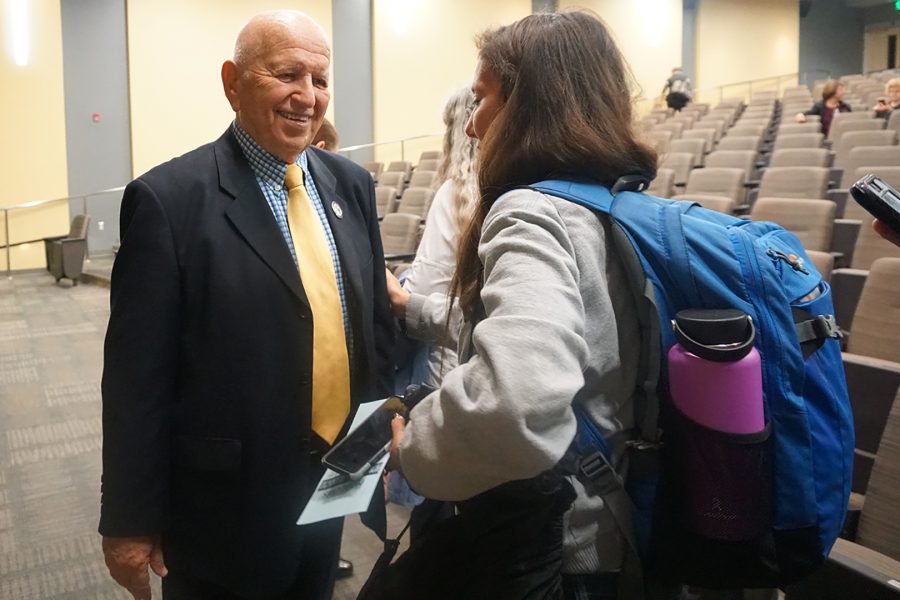Correction, Nov. 27: A quote in an earlier version from Jean-Pierre Gatillon said, “Today’s event highlights celebrating the human spirit in times of extreme diversity.” The quote has been corrected to say, “Today’s event highlights celebrating the human spirit in times of extreme adversity.”
Jerry Weiser, Holocaust survivor, came to Mt. SAC on Nov. 20 to speak to students and faculty about his experience growing up in World War II and the challenges his mother faced to reunite with him.
Weiser told stories of the tragedies his mother faced after her family vanished, taken by Nazis. With nowhere to go, she fled to Poland looking for work, met the love of her life and had her first child, Henri Jurai. Henri Jurai, now known as Jerry Weiser, underwent six different names throughout World War II.
The lights dimmed in the auditorium. Rain kept Weiser from arriving on time, but he still had enough time to give a compelling account. As Jean-Pierre Gatillon, a sociology professor at Mt. SAC, walked onto the stage, the audience calmed.
“Today’s event highlights celebrating the human spirit in times of extreme adversity,” Gatillon said. “The Los Angeles Museum of Tolerance knows Holocaust survivor speakers provide us not only with not living proof of the past, but with stark relevance with stories today.”
According to the International March of the Living website, there are approximately 140,000 survivors left in the United States as of 2016.
The Los Angeles Museum of Tolerance launched the Hope Lives campaign in hopes to expand the number of people that hear these speakers while they still can.
“We are facing the last years of this precious opportunity,” Gatillon said.
Gatillon introduced Weiser onto the stage. The room stood still and quiet. He was calm when he told his story, although once he approached the disappearance of his father and separation from his mother, sniffles passed throughout the auditorium.
“As hard as it was for a mother to give up a seven month old baby that she might never see again, she decided this was the only way she could save my life,” Weiser said.
Weiser was gratuitous when he spoke about the farmer who took care of him after his escape from the ghetto. After three and a half years, he was passed onto his neighbors, a Christian family, that treated him as their own. There, they baptized him and took him to church every Sunday. They promised that if he never was able to reconnect with his mother, they would adopt him.
Weiser gave students further insight into the times of the Holocaust by explaining the transportation of his mother to Auschwitz and other internment camps with terrible conditions. She was saved by her ability to understand and speak five languages when they needed a translator. Finally, she was sent to Sweden for rehabilitation when the camp she resided in was liberated by the Russian army in May of 1945. After being liberated, she requested to be reunited with her son.
Once requested, Weiser was taken from his previous home and sailed into London with 148 other Jewish children looking to be reunited with their families. From France, he then sailed to reunite with his mother in Israel.
“I was 8 years old when I met my mother for the first time,” Weiser said.
Weiser is one of the many survivors that chose to speak up about the horrific events that occurred during World War II and lives to tell his story in hopes of educating the coming generations. He went on to explain the two types of survivors there are today — some who tell their story of what they went through, and some who never speak of the Holocaust.
“This is why I tell my story,” Weiser said. “I saw there was different ways to live and now my satisfaction is telling my story.”
There were approximately six million adults and one and a half million children murdered during World War II.
“I hope we never experience another period like this,” Weiser said.
This event succeeded in touching its audience, many leaving teary-eyed and sniffling as one after the other trickled out. Those bearing praise stayed behind, grateful for the opportunity to hear a story from someone who remains gracious and kind, even with such unfortunate circumstances. Many gave thanks for his testimony.
Some of the audience felt connected to Weiser’s story because they could relate to his displacement in being an immigrant. Brandi Garcia-Valdes, 33, Cal Poly Communications student, was one of the many touched by the words of Weiser.
“I have family that are immigrants from Cuba,” Garcia-Valdez said. “I can relate.”
This is the second time Weiser has spoken at Mt. SAC. This event was hosted by the Sociology Department. A longer version of Weiser’s story can be read here.
A short video on his experience can also be viewed here.


